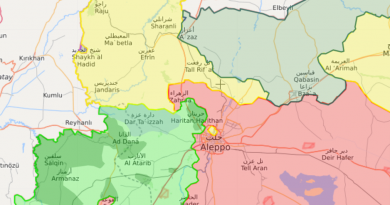Mexico Grapples with Resurgent Sinaloa Cartel
Jarrett Dang
Associate Editor
Two incidents – one a siege and the other a massacre – propelled Mexico’s Sinaloa Cartel to the limelight this month. The cartel, one of the largest and most influential in Mexico, deals in everything from the deadly opiate fentanyl to marijuana and is one of the main actors in the U.S.-Mexico drug trade.
The first incident occurred on October 17 in the city of Culiacan in Sinaloa state. A Mexican Army operation to arrest one of the Sinaloa Cartel’s main kingpins, Ovidio Guzmán López, the son the group’s former leader Joaquín “El Chapo” Guzmán, ended in shambles when the cartel mounted a rescue operation that saw the army in retreat and at least 13 dead, reports the New York Times. El Chapo’s son was released back to the cartel in exchange for the soldiers’ lives.
The surrender was an embarrassing defeat for the government of newly elected President Andrés Manuel López Obrador, also known as AMLO, and confirmed the scale of the Sinaloa Cartel’s power in Mexico. Immediately following the incident, the government came under heavy criticism, both for its handling of the raid and the subsequent release of Guzman. According to TIME, the president defended his decision to release the Sinaloa Cartel’s leader, saying that he prevented a massacre.
Obrador was elected last year on a platform of a ‘hugs, not bullets” policy in dealing with drug traffickers, promising to end the violence plaguing the country through more peaceful means than his predecessors. At the beginning of his presidency, AMLO declared an end to Mexico’s drug war, redirecting funding to social programs and creating a national guard that combines some elements of the federal police and military. The failed raid, however, exhibits little promise in the policy, as cartels are still powerful and willing to wage war against the government to keep the cash flowing.
The other incident, which occurred on November 4, saw nine Americans killed in an ambush in the Sinaloa Cartel’s territory. The attack was carried out by gunmen against a convoy of vehicles carrying members of a Mormon community from the United States. According to Vox, at least three women and six children were killed, all members of the LeBaron family that lived nearby. The motive behind the killings is unclear. Mexico’s security minister chalked the killings up to being collateral damage from warring cartels in the area. The LeBarons may have been specifically targeted, however, as the family had been harassed by cartels in the past and was even subjected to kidnapping and ransom attempts.
These incidents paint a grim picture of the future for Mexico’s new government. In both instances, it was largely unable to defend its own citizens and territory against the cartels, which continue to thrive off of Mexico’s entrenched corruption and the government’s scattershot approach to dealing with the violence. AMLO came into office hoping to stem violence by taking a different approach than his predecessors. However, trying to deal with armed groups with military-grade weapons, deep connections to politicians, and virtually limitless money has never been an easy task, and Mexico is no exception.
According to the LA Times, the narcos, short for narcotraficantes or drug traffickers in Spanish, sometimes even enjoy wide support among locals in their territory. In Sinaloa, ballads are written about the narcos’ fight against the government, detailing how the courageous traffickers defy a government that has forgotten about them. NBC News reports that at least 300,000 have died in Mexico since the beginning of the government’s drug war in 2006. In order for the violence to end, Mexico’s new government must fight the widespread corruption that allows traffickers to thrive.
However, the violence is not all the Mexican government’s fault – cartels thrive because of America’s insatiable appetite for drugs and the U.S. cannot ignore its own role in perpetuating cartel violence. The Trump Administration’s focus on combatting illegal immigration means that fewer resources are available to fight traffickers in Mexico. AMLO’s newly created national guard offered promise as a new force to fight the cartels, but it has largely been tied up trying to prevent Central American migrants from reaching the U.S. as part of an agreement between the two countries. Whatever the solution, America must work together with Mexico to stop the violence that afflicts its southern neighbor.


